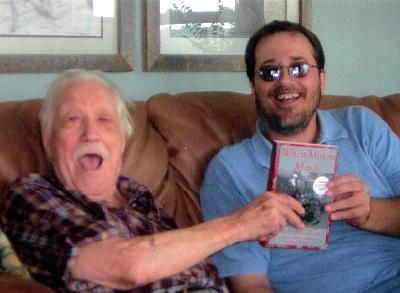WIDEN MINE FILM PREVIEWS ON HISTORY DAY

Kelly Thompson interviewing 91 year old
William C. Blizzard (left) in Ripley 2007
The West Virginia Labor History Association will present a new preview of Kelley Thompson's Widen Film Project at its booth in the WV Capitol Rotunda during The 2008 History Day at The Legislature today from 9 a.m.-2 p.m.
Mr. Thompson has been working for more than a year on his film about the famous 1952 Widen, Clay County UMWA strike lead by Bill Blizzard in his last major battle with WV coal mine operators.
The UMWA finally beat J.G. Bradley, the longtime president of the WV Coal Association and one time president of the National Coal Association.
He eventually sold the mines and everything he owned in West Virginia. Thompson has interviewed the daughter of J.G. Bradley for the film. He also spoke with William C. Blizzard, the son of Bill Blizzard, and the author of the recent landmark book, "When Miners March," Blizzard recently celebrated his 91st birthday.
Thompson has been traveling the state interviewing people still living who were involved in the strike. After interviewing more than thirty people in Clay, there has been a buzz of talk throughout the community in anticipation of the film.
The film will have its world premiere on May 10th at The South Charleston Museum along with the first film on Mother Jones, co-sponsored by the WV Labor History Assn. and the South Charleston Museum.
This year WVLHA nominated, fired West Virginia Archives Director Fred Armstrong to become a 2008 WV History Hero.
   Thompson said "In Appalachia coal is king, and it was not always benevolent ruler."
In a system where coal operators practically owned the people who worked for them, there was little mercy or kindness. Widen is the place that broke all the rules.Â
The violence that filled the coalfields of West Virginia and Kentucky were diverted from Widen until 1952.
Today the remnants of Widen, The Elk River Lumber and Coal Company and the BC&G Railroad are found strewn throughout the valley, looking like a worn Appalachian quilt, with patches and threads no longer attached to the whole.
Widen was built as a coal company town in 1911 by the Elk River Coal & Lumber Company. The company, organized in 1905, succeeded an 1898 association of the same name composed of northern capitalists investing in central WV lumber and coal lands.
To extract lumber and coal, the Buffalo Creek & Gauley Railroad was built 18.6 miles out Dundon Ridge to Widen.
J.G. Bradley, fresh out of Harvard Law School in 1904, came to Clay County as vice president of the railroad. L.G. Widen, the town's namesake, directed the building of the Buffalo Creek & Gauley.
Bradley soon became president of the Elk River Coal & Lumber Company, controlling more than 80,000 acres of land.
Practicing "welfare capitalism" designed to attract worker loyalty to him and his company, Bradley built a solid town at Widen.
Worker homes, painted company red, were well-constructed. Widen grew to posses a bank, an Elrico company store, schools, and churches, all built by the company.
Eventually there appeared a YMCA, a high school, a swimming pool, and a ball diamond with company-sponsored teams. Isolated in its early history, Widen prospered during the 1920s when WV labor unions had declined.
In the early 1930s, the United Mine Workers renewed its drive to unionize WV miners.
Strikes at Widen occurred in 1933 and 1941, the latter violent, but Bradley defeated the union.
Again in 1952, a bitter strike erupted. Sixteen months later, after one man was killed and friendships and families had suffered severe disruption, the union called off the strike, but the company never recovered.
Bradley sold the mines to the Clinchfield Coal Company in 1959. Soon it was unionized under the new owners. Widen continued to produce coal until 1963, when the mine and the railroad ceased operation.
Now Widen is largely a ghost town where former residents gather each July on Widen Day to reminisce about both the good times and the troubles.
SEARCH Widen on the Herald for stories.